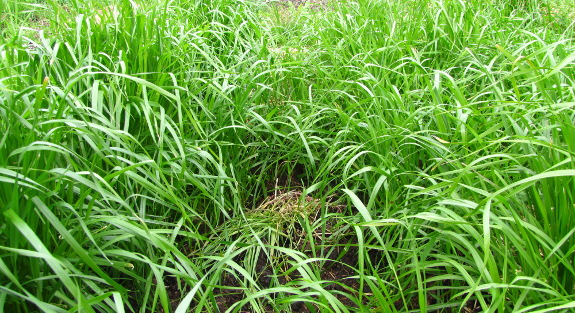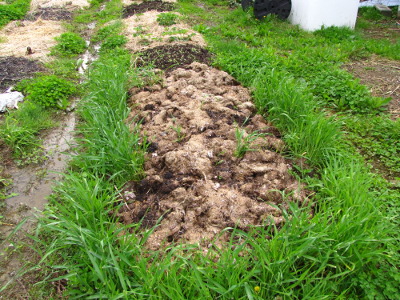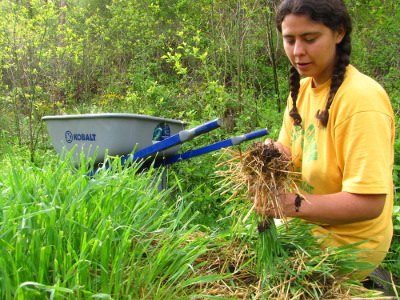
Mow- and smother-kill cover crops

I'm a big fan of autumn
cover crops
(especially oats and oilseed
radishes), but I'm
starting to feel like cover crops in the spring are more worry than
benefit. The trouble is that most of the fall crops that didn't winter-kill (annual
ryegrass and barley) and the cover crops I'm trialing this spring (oats and
field peas) don't
mow-kill very well. As the main spring planting date approaches,
I've ended up having to resort to more time-consuming measures to get
these cover crops out of the way without tilling.

At the end of March, I cut
the barley and ryegrass as close to the ground as
possible and topped the beds off with an inch of manure and then a
heavy coating of mulch. This method was 95% effective for the
barley and about 75% effective for the ryegrass, although in both cases
the beds developed a ring of living cover crops (easy to mow repeatedly
and turn into part of the aisles.) I was left hand-weeding the
plants that were still poking up out of the middle of beds, a process
that is quite easy with barley but nearly impossible with
ryegrass. I suspect I may have to resort to a kill mulch to get rid of the ryegrass,
which won't be a big deal since I've planned late potatoes to go in
those beds and they'll enjoy the extra organic matter. Still,
it's a bit nerve-wracking to see greenery where I need to plant
shortly, especially since two months of flooding means we still can't
drive the truck off the farm to pick up more compost and mulch.
 Our
spring oats and field peas bounced right back when I tried to mow-kill
them, but since I'd put the beds' compost down when planting, I didn't
have enough allotted to smother these spring beds the way I did the
overwintering fall cover crops. Instead, I've been ripping up the
oats and peas and laying them sideways and upside down across the bed
--- pretty easy since oats come out of the ground without much
effort. The beds that I dealt with during a hot, dry spell now
have a straw-like mulch of dead oats on top, but I might have to reweed
the beds I dealt with during a rainy period.
Our
spring oats and field peas bounced right back when I tried to mow-kill
them, but since I'd put the beds' compost down when planting, I didn't
have enough allotted to smother these spring beds the way I did the
overwintering fall cover crops. Instead, I've been ripping up the
oats and peas and laying them sideways and upside down across the bed
--- pretty easy since oats come out of the ground without much
effort. The beds that I dealt with during a hot, dry spell now
have a straw-like mulch of dead oats on top, but I might have to reweed
the beds I dealt with during a rainy period.
Luckily, all of the
extra mulching we did this fall means the other garden beds are in
prime condition and I have time to mess around with experimental cover
crops. Once again, Mark was right --- it was worth every penny we
spent on mulch last year!
Want more in-depth information? Browse through our books.
Or explore more posts by date or by subject.
About us: Anna Hess and Mark Hamilton spent over a decade living self-sufficiently in the mountains of Virginia before moving north to start over from scratch in the foothills of Ohio. They've experimented with permaculture, no-till gardening, trailersteading, home-based microbusinesses and much more, writing about their adventures in both blogs and books.
Want to be notified when new comments are posted on this page? Click on the RSS button after you add a comment to subscribe to the comment feed, or simply check the box beside "email replies to me" while writing your comment.
- Remove comment
- Remove comment
